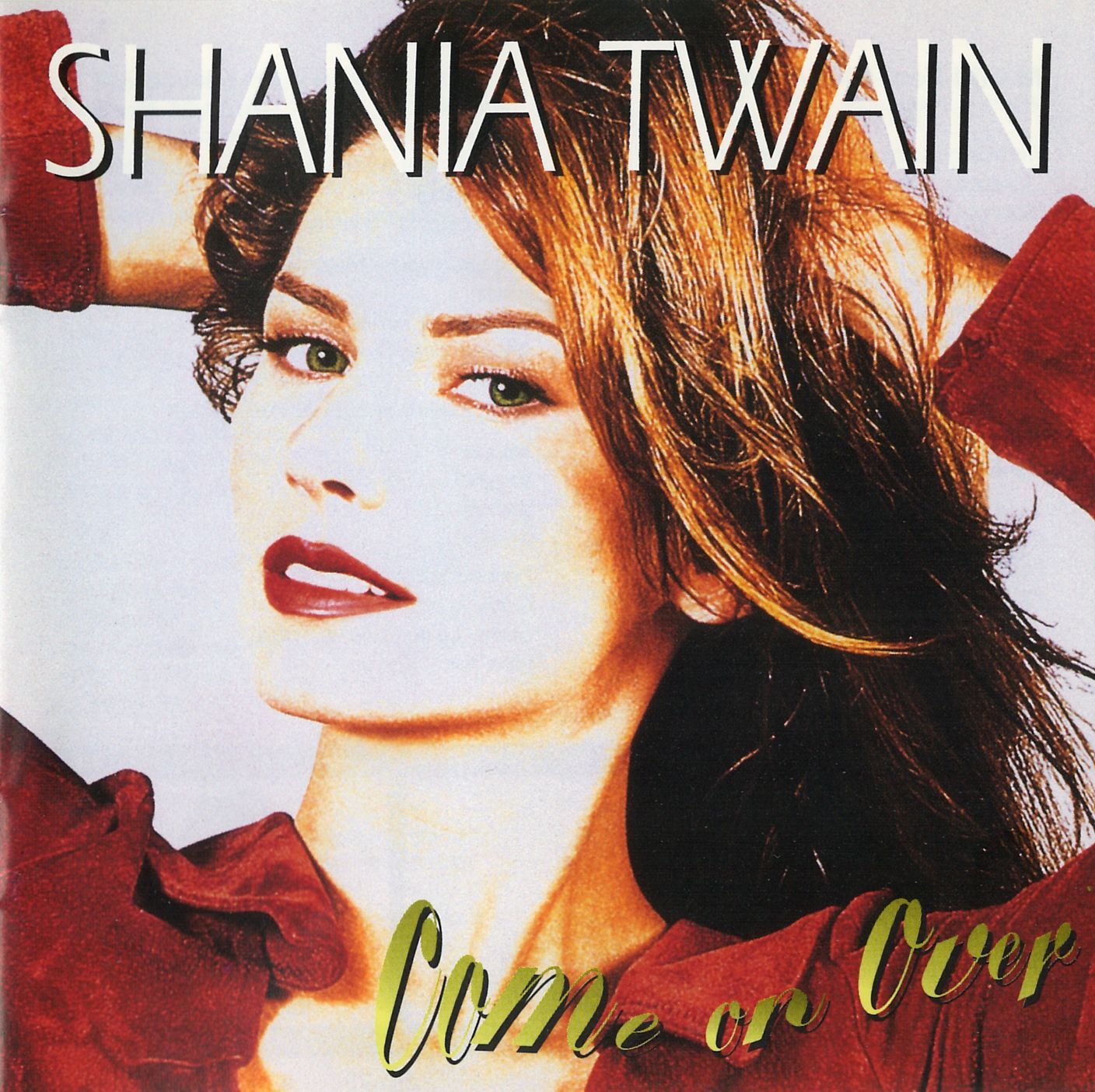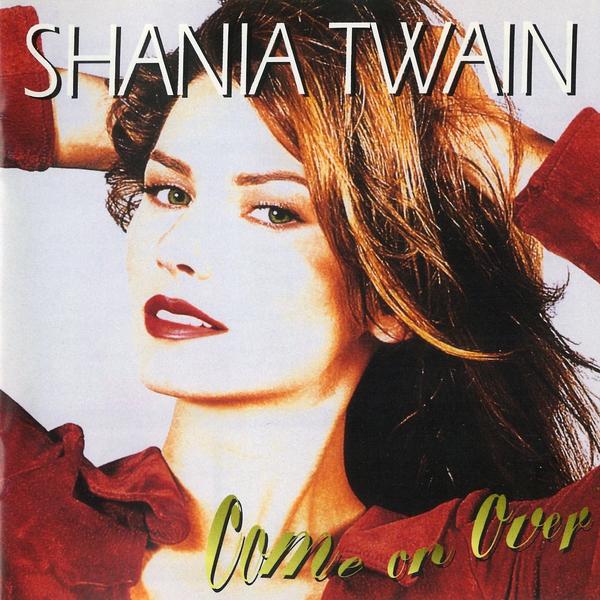
UMG Recordings | 1997





Link copied


To say that Shania Twain’s 1997 album Come On Over was ahead of its time would be a massive understatement.
Packed solidly with a dozen original singles - plus four more to give the listener an “hour of music” - this landmark record propelled Shania from a shy Canadian cowgirl into a global icon – transforming the very landscape of country music in the process.
She crossed over into the heart of the mainstream in one giant stride, as her producer, co-writer and then-husband Mutt Lange brought his big beats and pop-rock sensibilities to the party.
1997 was dominated by the class of Tim McGraw, Garth Brooks, Kenny Chesney, George Strait, and Toby Keith; with Faith, Reba, LeAnn and Martina trying to leave their mark in-between.
It was the year of Tarantino and Titanic; of Gianni Versace’s murder, Mike Tyson biting his opponent’s ear and the death of Diana. Madeline Albright became the first female US Secretary of State, as the country ranked 52nd in the world for female representation in government.
Into this hotbed of toxic masculinity and ongoing pushback for women stepped accidental feminist Shania Twain, who was, crucially, in charge of her own image and music.
She brought millions of new fans to an ageing sound, while bringing fresh sounds to old fans – speaking directly to these followers through her music and videos, long before the age of social media.
Many labelled Shania as too ambitious (as if striving for the top is bad), as a square peg in a round hole (is she pop or country), as not belonging (being Canadian), and not being responsible for her achievements (despite writing and co-writing her songs).
If it wasn’t already obvious that the industry was misogynistic, that didn’t impress her much. Having opened the door for creative freedom with '95's Woman in Me, Shania smashed it off its hinges with Come On Over.
First, she ripped up the rulebook by releasing it in three different versions; the original country album – complete with mandolin, fiddles and pedal steel– followed by revised pop and international club versions.
Shania would not bend or break in the face of Nashville antipathy and critical hostility. She stuck to her guns, forcing the industry to play by her rule book. She couldn’t join them, so she beat them.
Hauled over the coals for blending genres, sidestepping Nashville’s endless supply of songwriters by writing her own material and collaborating with hard rock producer Lange, she shrugged and went back to business.
“The very thing that I get criticized for,” she said, “- being different, original and doing my own thing – is the very thing that's making me successful.”
When the New York Times labelled Shania a rebel who “sings about taking charge and about unabashed lust; she bares her navel”, her reply was clear.
“I refuse to play down the way I look in order to be taken seriously as an artist," she said. "I’m aware there’s this mentality that you’re not allowed to be intelligent and good-looking, or that you’re not credible if you wear your hair like this or your shirt like that. But I will not accept that. It’s not right”.
Cue the lusty female empowerment anthem, ‘Man I Feel Like a Woman’, which won a Grammy for Best Female Country Vocal Performance. Inspired by seeing drag performers back in Ontario, this song started with the title before “writing itself”.
With a music video role-reversing Robert Palmer's ‘Addicted to Love’, Shania stands in front of a group of men, all dressed alike, wearing a long coat and veiled top hat, before stripping down to a black corset and mini skirt. When she sings “I ain't gonna act politically correct / I only wanna have a good time”, you know she means every word.
She says much of her material has a “feminine, female perspective, but a powerful one. It's not only girl power, its gay power. I think that song really stands for both”.
The title track also deservedly won a Grammy for Best Country Song, with its irrepressible beats and bouncy, zydeco flavour making the most of Joey Miskulin’s accordion. Of course, the message of being a supportive, dependable friend is universal.
Another that’s stood the test of time, much like its subject, is the evergreen ‘You’re Still the One'. The mandolin and rousing singalong chorus underpin her tribute to longevity and durability in marriage against the odds – initially for her husband and musical partner Mutt Lange, and of late focusing on her late mother and stepfather.
This would, of course, also win Grammys; for Best Country Song and Best Female Country Vocal Performance respectively.
There’s welcome wit in the cheekiness of ‘That Don’t Impress Me Much’, which lists the kind of suitors she’s wary of: “you're a rocket scientist”, “you're Brad Pitt”, “you've got a car”, when all she really wants is a man who can keep her “warm in the middle of the night”.
Twain’s cultural impact from this point was undeniable – amassing cultural kudos from two more hits: ‘Rock This Country’ was used by both Al Gore and Hillary Clinton in their respective presidential campaigns, while ‘You’ve Got A Way’ appeared on the soundtrack for the mega-hit of a British Rom-Com Notting Hill.
But, perhaps most importantly, Come On Over feels way ahead of its time in tackling sensitive subjects.
Somehow anticipating the rise of movements like #MeToo in the three decades after, there’s a trio of key songs that talk directly to female listeners and their other halves. ‘Don’t Be Stupid (You Know I Love You)’ is about a partner’s excessive control and oppressive jealousy.
While the music video features Riverdance-style Irish dancers, the lyrics speak of her man looking over her shoulder as she reads her mail and suspecting ulterior motives when she paints her nails.
‘If You Wanna Touch Her, Ask'’s motion for consent is explicitly stated, as she adds further advice: “If you wanna get to know her / Really get inside her mind / If you wanna move in closer / Take it slow, yeah take your time” all culminating in that key line.
‘Black Eyes, Blue Tears’, approaches escaping domestic abuse in very frank terms. Again, it has a pop sheen, with lovely wah-wah guitar from Dan Huff, but that doesn’t undo its uncompromising sentiment; “I'd rather die standing / Than live on my knees / Begging please – no more”.
You can sense the urgency and personal experience coursing right through Come On Over. While Shania went on to perform at arenas, stadiums, Super Bowls and rule the global charts, she always knew her fans. She walked the walk and talked the talk, saying; “it's important to give it all you have, while you have the chance”.
Come On Over nudged country music into the 21st Century while busting the business wide open. It also showed Shania wasn’t going to be a one-hit-wonder, but a bona fide icon and mould-breaker. Man, it feels like a landmark.
8/10.
Check out Holler's Best Shania Twain Songs list here.
For more Shania Twain, head here.
You can purchase the record from Holler's selected partners below:

UMG Recordings | 1997
Items featured on Holler are first selected by our editorial team and then made available to buy. When you buy something through our retail links, we may earn an affiliate commission.
For more on Shania Twain, see below:
